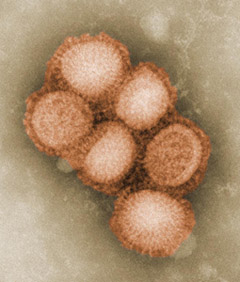H1N1 Flu (Swine Flu) and You

What are the signs and symptoms of swine flu in people?
The symptoms of swine flu (H1N1) in people are similar to the symptoms of regular human flu and include:
|
H1N1 (Swine Flu) Virus Photo courtesy of C.S. Goldsmith and A. Balish CDC Public Health Image Library (PHIL) |
Some people have reported diarrhea and vomiting associated with swine flu (H1N1). In the past, severe illness (pneumonia and respiratory failure) and deaths have been reported with swine flu (H1N1) infection in people. Like seasonal flu, swine flu (H1N1) may cause a worsening of underlying chronic medical conditions.
What can I do to protect myself from getting sick?
There is no vaccine available right now to protect against swine flu (H1N1). There are everyday actions that can help prevent the spread of germs that cause respiratory illnesses like influenza. Take these everyday steps to protect your health:
|
- Cover your nose and mouth with a tissue when you cough or sneeze. Throw the tissue in the trash after you use it.
- Wash your hands often with soap and water, especially after you cough or sneeze. Alcohol-based hand cleaners are also effective.
- Try to avoid close contact with sick people.
You should be aware that swine influenza viruses are not spread by food. You cannot get swine influenza (H1N1) from eating pork or pork products. Eating properly handled and cooked pork products is safe.
How long can an infected person spread swine flu to others?
People with swine influenza virus (H1N1) infection should be considered potentially contagious as long as they are symptomatic and possible for up to 7 days following illness onset. Children, especially younger children, might potentially be contagious for longer periods.
What should I do if I get sick?
If you live in areas where swine influenza (H1N1) cases have been identified and you become ill with influenza-like symptoms, including fever, body aches, runny nose, sore throat, nausea, or vomiting or diarrhea, you may want to contact their health care provider, particularly if you are worried about your symptoms. Your health care provider will determine whether influenza testing or treatment is needed.
If you are sick with influenza, CDC recommends that you:
- Stay home from work or school
- Limit contact with others to keep from infecting them
- Avoid touching your eyes, nose or mouth. Germs spread this way.
The CDC advises seeking emergency medical care if the following conditions are experienced:
In children
- Fast breathing or trouble breathing
- Bluish skin color
- Dehydration
- Not waking up or interacting
- Irritability and resistance to being held
- Flu-like symptoms improve then return with fever or worse cough
- Fever with a rash
In adults
- Difficulty breathing or shortness of breath
- Pain or pressure in the chest or abdomen
- Sudden dizziness
- Confusion
- Severe or persistent vomiting
Are there medicines to treat swine flu?
While there is no vaccine to prevent swine flu (H1N1), CDC recommends the use of the antiviral drugs oseltamivir (Tamiflu®) or zanamivir (Relenza®) to treat the infection. These prescription medications keep flu viruses from reproducing in the body and can make the illness milder. They may also help you feel better faster and prevent serious flu complications.
Antiviral drugs are most effective if they are started within 2 days of the first sign of symptoms.
How do I find out if any cases of swine flu have occurred near where I live?
The CDC keeps an updated count of confirmed cases of swine flu (H1N1) infections in the United States. You can also contact your state or local health department for information.
Reference
Centers for Disease Control and Prevention, H1N1 Flu (Swine Flu) and You
For more information:
Go to the Pandemic Flu health topic.